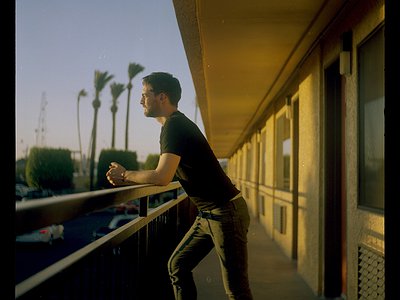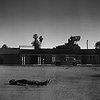Collaborations can take on many forms. What role do they play in your approach and what are your preferred ways of engaging with other creatives through, for example, file sharing, jamming or just talking about ideas?
I don’t collaborate any more, not at the moment. I spent my 20s being in bands, listening to other people’s ideas, being inspired and mostly intimidated by other people. For someone of my disposition, it’s not always the best idea to collaborate too much, it causes me a lot of trouble. I’m not a back-to-back DJ or a jazz drummer, so, there’s not really a platform for collaboration.
In terms of talking about ideas, my two brothers Adam and Daniel are both musicians. I get more guidance by not playing music with them – and therefore being completely free to discuss approaches in a critical manner, than I ever could by playing with them.
There are many patterns and phases to life. At some points, it feels right to retreat inwards and discover the well inside of the self, without the direction influence of the outside world. In the future, in my dotage on my lavender farm, I will paint great primary colour canvasses and collaborate with an orchestra of software operators around the world.
Could you take us through a day in your life, from a possible morning routine through to your work? Do you have a fixed schedule? How do music and other aspects of your life feed back into each other - do you separate them or instead try to make them blend seamlessly?
The number one reason why I do not have a fixed schedule for creation, and one of the reasons why it takes me five years to make an album, is that I have to work in a job unrelated to music for a living. I have never earned any money off music and I don’t see how that will ever change. I’m ok with that I guess.
I would like to use this opportunity to discuss Spotify CEO, Daniel Ek. That person has no idea of the sacrifices and the jeopardy and the courage it takes to make music that comes from the heart (as opposed to tech house playlist landfill). Daniel Ek is a human being who has been sent out into the world by his own algorithm to feed it, to find more meat for the machine. I think Spotify encourages lazy listening
habits. Cancel it. Find a new way to listen. Buy records. They will make your house into a home. They will feed your heart.
So yes, I just try my best to work whenever I can. Which is not often enough, given that by my own definitions, it is without question and by far the most important thing I am doing in my little life.
Could you describe your creative process on the basis of a piece or album that's particularly dear to you, please? Where did the ideas come from, how were they transformed in your mind, what did you start with and how do you refine these beginnings into the finished work of art?
I think it’s different every time. Here’s how I’m doing it right now on the upcoming record, currently titled Life Expectancy.
I - Music is a compulsion. It’s something that you just have to do, because it is an identity, a function. If you deny this function, all sorts of trouble will arise, like a plant without light.
II - Through this compulsion there is a response to the world that appears while playing and recording. Very often I am thinking about people in my life, especially my friends, and playing for them.
III - After four or five songs have come together, you can stand back and look at them and realise that there is an overwhelming theme. It’s a bit like keeping a diary or a journal of dreams. You might not even notice what the themes are until you see them collected together. At this point I create a title for the collection.
IV - Reverse engineer the previously recorded pieces so that they fit together more closely under this established theme. New compositions should not be crow-barred into this theme though. Hopefully they will fit, but they don’t always.
V - Re-record everything three times. Spend hundreds of hours mixing, humanizing MIDI, ironing out timing and pitch issues, tuning the bassoons. Then delete it so it never gets heard.
VI - Abandon everything. Start a new record and hope that this time it will all work out.
There are many descriptions of the ideal state of mind for being creative. What is it like for you? What supports this ideal state of mind and what are distractions? Are there strategies to enter into this state more easily?
I can tell you what it’s not: it’s not relying on drink or drugs. Creativity has this glamor associated with it, but for me it comes down to working hard. Once you start rolling about in your own glamor, you’re in trouble. A clear mind, a clear heart, a straight back, self-confidence, purpose, and hanging on for dear life to the melodies inside your head. Seeing through your vision. Trying to keep stress outside the front door. Capturing the elements that exist outside your head.
How is playing live and writing music in the studio connected? What do you achieve and draw from each experience personally? How do you see the relationship between improvisation and composition in this regard?
My music is best served in site-specific spaces. It is designed to be experienced internally, by the individual, allowing them to draw their own conclusions. That space is either the location of the listener and their speakers, or it is a space that I have curated for my music to be played in: a second world war bunker or an abandoned tower block or a Japanese car park.
I dislike playing live. I’ve played some really big and fancy live shows, some tiny ones in grim little sweatbox basements and I really didn’t enjoy any of it. For my music as Conrad Clipper it’s not even appropriate for me to play live, I’m not a performer. I’m way too shy and private for all that.
My ultimate goal as an artist is to get other people to play my work. If I ever reach a stage where my work is played by an orchestra, whether it’s the Portsmouth, Sinfonia or the Berlin Philharmonic, then I can die happy.
Improvisation occurs in all great recordings. I think the trick is to create an atmosphere that encourages improvisation during takes. Improvisational magic can be felt by the listener.
How do you see the relationship between the 'sound' aspects of music and the 'composition' aspects? How do you work with sound and timbre to meet certain production ideas and in which way can certain sounds already take on compositional qualities?
I think about this a lot, it’s one of my primary concerns in music. It stems from the obstruction of tape, the loss of fidelity, and how well that connects with memory, and the loss of clarity that occurs in our memory over time. I try to represent this with decaying tapes, and sounds that themselves embody a quality of otherness, outsider songs.
This method means that sound disrupts the composition, hides certain elements of it, only revealing itself after multiple listens. Something about a pure and clean recording disturbs me somehow, like food without seasoning or watching a film in the cinema with the lights up.
Our sense of hearing shares intriguing connections to other senses. From your experience, what are some of the most inspiring overlaps between different senses - and what do they tell us about the way our senses work? What happens to sound at its outermost borders?
Just as smell can be transportative, sound has a tremendous ability to return the listener to old emotional states. So, in the same way that you can’t listen to some albums because they remind you of a breakup, other songs will return you to childhood, when your grandparents were still alive. It’s time travel.
Art can be a purpose in its own right, but it can also directly feed back into everyday life, take on a social and political role and lead to more engagement. Can you describe your approach to art and being an artist?
It is everything that I am, it’s the only thing I am capable of. I don’t have a partner or children or much of a legacy outside music. I don’t even know what I’m doing with music. I can’t read music and I have no formal training. It’s so funny. Human beings are so silly.
We should laugh at ourselves, and be enormously, immensely thankful for what we are and for the people who love us in spite of everything. Then, we can do some good in the world.
It is remarkable, in a way, that we have arrived in the 21st century with the basic concept of music still intact. Do you have a vision of music, an idea of what music could be beyond its current form?
Haha are you serious? This sounds like you’re labouring under some kind of misapprehension that because technology has moved forward, that music must move forward. The Flaming Lips new album as a Virtual Reality helmet. Lana Del Ray as a collaborative technical manual for Sibelius. Trent Reznor as a voice assistant. God help us all.
Music as a network is not intact in any real-world way, in fact it’s very fucked for so many artists. The ecosystem of support is destroyed. It is so difficult, there is so much failure, so many people fall along the way in the most desperate of circumstances.
If I was someone unbearable like Elon Musk or Jeff Bezos, I would create all manner of funds to support artists. We are really struggling out here. It is extraordinary that anyone not on a major label makes anything at all, but that just shows you how much passion there is out there.
I’m immensely thankful to the small independents taking risks and funding things out of their own pockets, while the artists go to work and try to fit creativity in where they can. God bless all those people who support idiots like me on their quest to nothingness.



